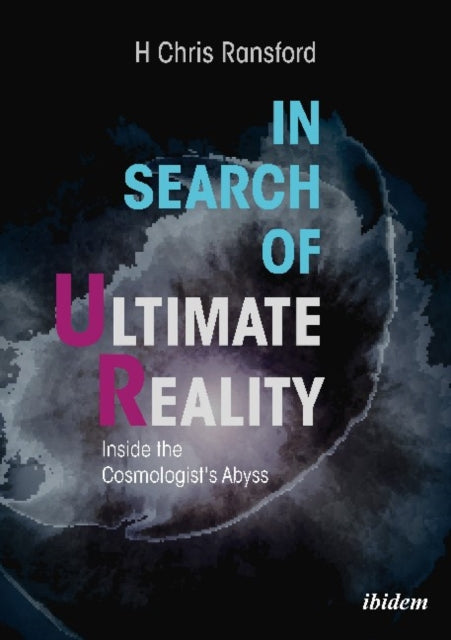H. Chris Ransford
In Search of Ultimate Reality - Inside the Cosmologist's Abyss
In Search of Ultimate Reality - Inside the Cosmologist's Abyss
YOU SAVE £2.50
- Condition: Brand new
- UK Delivery times: Usually arrives within 2 - 3 working days
- UK Shipping: Fee starts at £2.39. Subject to product weight & dimension
Bulk ordering. Want 15 or more copies? Get a personalised quote and bigger discounts. Learn more about bulk orders.
Couldn't load pickup availability
- More about In Search of Ultimate Reality - Inside the Cosmologist's Abyss
The last known remnants of reality are the disembodied laws of mathematics, which are difficult to probe further. Chris Ransford explains why full nothingness cannot exist and what most likely underpins and enables reality. He suggests how such knowledge may be verified and deployed to achieve a better alignment with reality.
Format: Paperback / softback
Length: 160 pages
Publication date: 08 December 2021
Publisher: ibidem-Verlag, Jessica Haunschild u Christian Schon
The concept of a fundamental reality, an entity that existed before the universe and continues to exist even after the disappearance of matter, time, and space, is a topic of profound contemplation. While most cosmological and physical models suggest that the last known remnants of reality are the disembodied laws of mathematics, there remains a deep desire to explore further. In his book, "Nothing: A History of Zero," Chris Ransford delves into the complexities of this topic, employing contemporary physics to explain why full nothingness, a state in which even the laws of mathematics would not exist, is impossible. Through a captivating narrative, Ransford guides readers on a journey to understand the underlying principles that enable and sustain reality. He raises thought-provoking questions about the verification and practical application of this knowledge to achieve a better alignment with the world around us.
The idea of a fundamental reality has captivated the minds of philosophers and scientists for centuries. While the laws of mathematics are often considered the last known remnants of reality, there is a growing belief that something deeper and more fundamental exists. In his book, "Nothing: A History of Zero," Chris Ransford explores this concept in depth, employing contemporary physics to explain why full nothingness, a state in which even the laws of mathematics would not exist, is impossible.
Ransford begins by discussing the concept of space and time, which are fundamental to our understanding of the universe. He explains that space and time are not static entities, but rather they are created and defined by the presence of matter and energy. Without matter and energy, there would be no space or time, and therefore, no universe.
However, even with the presence of matter and energy, Ransford argues that full nothingness is still impossible. He explains that the laws of mathematics are not just abstract concepts, but they are the physical expressions of the underlying structure of the universe. The laws of mathematics are not just rules that we observe, but they are the very fabric of reality itself.
To illustrate this point, Ransford introduces the concept of the "universe as a computer." He argues that the universe is a complex system that can be modeled using mathematical equations. Just as a computer runs on software, the universe runs on the laws of mathematics. However, the laws of mathematics are not just software, they are the hardware of the universe.
Ransford then delves into the concept of quantum mechanics, which is the branch of physics that deals with the behavior of matter and energy at the atomic and subatomic levels. He explains that quantum mechanics is not just a theory, but it is a fundamental law of nature. Quantum mechanics allows us to understand the behavior of particles and the interactions between them, and it is the basis for all modern physics.
However, even with the laws of mathematics and quantum mechanics, Ransford argues that full nothingness is still impossible. He explains that the laws of mathematics are not just rules that we observe, but they are the physical expressions of the underlying structure of the universe. The laws of mathematics are not just software, they are the hardware of the universe.
In conclusion, "Nothing: A History of Zero" is a thought-provoking book that challenges our understanding of the universe. By employing contemporary physics, Ransford explains why full nothingness is impossible and why the laws of mathematics are the fundamental expressions of the underlying structure of the universe. This book will inspire readers to explore the deeper mysteries of the cosmos and to seek a better alignment with the world around us.
Weight: 194g
Dimension: 149 x 213 x 16 (mm)
ISBN-13: 9783838213293
This item can be found in:
UK and International shipping information
UK and International shipping information
UK Delivery and returns information:
- Delivery within 2 - 3 days when ordering in the UK.
- Shipping fee for UK customers from £2.39. Fully tracked shipping service available.
- Returns policy: Return within 30 days of receipt for full refund.
International deliveries:
Shulph Ink now ships to Australia, Belgium, Canada, France, Germany, Ireland, Italy, India, Luxembourg Saudi Arabia, Singapore, Spain, Netherlands, New Zealand, United Arab Emirates, United States of America.
- Delivery times: within 5 - 10 days for international orders.
- Shipping fee: charges vary for overseas orders. Only tracked services are available for most international orders. Some countries have untracked shipping options.
- Customs charges: If ordering to addresses outside the United Kingdom, you may or may not incur additional customs and duties fees during local delivery.


